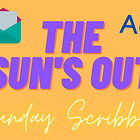Hi there,
At last, I can sit down on a Sunday and not be pestered by a gremlin on my shoulder saying “Well you could be and should be revising…” - exams done! And Results Day is in the middle of August, a good while away. I think they went well on the whole, so we shall see what happens on the 15th.
For now, it’s confronting the ‘void’ that inevitably follows after running so hard at a singular goal for so long. It’s been a relatively quiet week since, although I was in school every day - final exam on Monday, cricket training on Tuesday for the Wednesday match, music lessons and meetings on Thursday and a Leavers Celebration Day on Friday.
I’m also committed to getting back to writing, both in my journal and of course my beloved blog.
Highlight of the week: contrary to expectation, it’s not the school Prom on Monday, where I had great fun. It’s 15:30 on Tuesday. I station myself on a bench by the boundary of our main cricket pitch at school, basking in the shade amidst soaring weather of 28C. I sit back, watch a ball being bowled in the Year 9 game and notice the absence of our revision guilt gremlin - I was a free man.
With the grind of exams, the best kind of motivation is intrinsic motivation, the joy of doing the work.
“The work is its own reward” Arthur Conan Doyle
And it is easiest to measure how much work you’re doing by tracking time. That’s what I’ve been doing for the past 3 years of studying, using a website/app called Toggl Track. Rather effortlessly, it allows me to log how long I’m spending on each subject in a particular time, and I’ve been grateful for it in this exam season on a few counts:
When I felt like I needed a confidence boost, I could create a report to see how long I’d spent on that particular subject over the past 2 years, reminding me of the work I’d put in
The charts allowed me to push myself to beat the previous week’s totals or to push on that little bit more to reach a certain milestone (e.g. 200 hours of STEP)
As I wrote recently, I’ve been setting targets on how much time I should be spending on each subject. Toggl has continued to be useful for this.
It’s taught me the value of tracking inputs and outputs, in multiple settings.
The blog! Along with the need to keep publicly consistent, one aspect which I found myself referencing in a chat this week was the currently-hiding ‘Book of the Week’ section at the bottom of the email. It was a driver for me to read a few pages of a book on a Sunday morning, in order for me to say “I’ve read this book this week!” on the blog, instead of coming across on a public platform as though I’m slacking, although I’m sure not many people cared. A niche example 😂
Duolingo streaks - having gotten back on the app to dust off my German, I was struck by just how much emphasis there is on becoming ‘friends’ with people you know for accountability, reminders to “Make sure you don’t break your streak!” and multi-layered league structures. Of course, it’s all designed to keep you on the app but it is partly designed to breed consistent practice.
The Uber map - this example comes from this excellent podcast episode I listened to two summers ago.
What bothers us about taxis isn’t necessarily the wait, it’s the uncertainty. “Has he already left? Has he missed us? I’m getting late, I need to be there soon.” But the map eliminates all that - less stress because you feel more informed. The duration of waiting doesn’t change but the quality changes.
Here are a few reasons why tracking works, courtesy of one of my favourite books (and a summer one from 2 years ago again, funnily enough), Atomic Habits by James Clear
“Making progress is satisfying and visual measures provide clear evidence of your progress”, whether that’s an increasing pot of savings, a table with 7 days in a row of no crisps checked off or a fall on the weighing scale dials. Hence tracking habits allows us to benefit from the mantra “Don’t break the chain”.
It’s obvious - recording your last action triggers you to act on doing it another time
Gives you accurate information - you are kept honest and can’t lie to yourself. After all, to quote Richard Feynman, “The first principle is that you must not fool yourself, and you are the easiest person to fool”
It’s attractive - “the most effective reform of motivation is progress. A signal that we are moving forward makes us more motivated to continue down that path”, so tracking can almost become addictive and feed your willingness to keep going
It’s satisfying - the little kick you get from ticking off an item from your to-do list applies here too. It can be considered to be a form of instant gratification, whilst also delayed gratification
Helps you focus on the process, not the result.
For tracking to be effective, Clear mentions that it should be automatically measured (that way, it’s more likely to be recorded - as I’ve explored here!) and you should record it immediately after completing the action.
To finish, a couple of points to make sure you are tracking things right.
You should be tracking the right metrics - I could be spending hours on a topic, but I should also be looking at the output and seeing if there is an effect. Data should be well-rounded and give yourself a good picture. An example might be YouTube views replaced by the video completion rates.
You should track for the right reasons - a friend of mine warned me about this when I set a goal for how long STEP to do over the May half term. You must make sure that you’re working smart as well as hard, and that it’s not just hours for the sake of hours. To go back to Clear1,
Don’t become driven by the number rather than the purpose behind it. The human mind will want to “win'“ whatever game is being played.
We end up focusing on working long hours instead of getting meaningful work done [the difference between being busy and productive]. This is sometimes referred to as Goodhart’s Law: “When a measure becomes a target, it ceases to be a good measure”.
When the fruits of our labour are pushed to the future, we are more likely to keep going when we know that we are going in the right direction. Thus tracking progress allows us to stay motivated towards achieving our goals, step by step.
Podcast of the week🎙️
Can’t quite relate to this feeling now at the start of a long holiday but it’s a feeling we all feel from time to time, so here’s how to work with it
Thing I’m grateful for this week 🙏
My dad for picking me up late after Prom on Monday
Quote of the week 💬
Ships don’t sink because of the water around them. Ships sink because of the water that gets in them. Don’t let what’s happening around you get inside you and weigh you down.
As we cross halfway through the year, hope you can enjoy the start of a new week. And I’ll see you again next Sunday 😊
Adi
Nice article about Goodhart’s Law if you want more - https://builtin.com/data-science/goodharts-law



